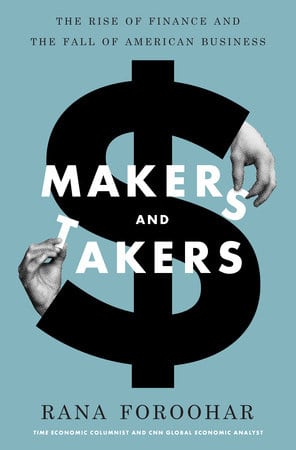 This week, Chris interviews Time Magazine assistant managing editor and economic columnist Rana Foroohar about the findings within her new book Makers and Takers: The Rise of Finance and the Fall of American Business.
This week, Chris interviews Time Magazine assistant managing editor and economic columnist Rana Foroohar about the findings within her new book Makers and Takers: The Rise of Finance and the Fall of American Business.
Eight years on from the biggest market meltdown since the Great Depression, the key lessons of the crisis of 2008 still remain unlearned — and our financial system is just as vulnerable as ever. Many of us know that our government failed to fix the banking system after the subprime mortgage crisis. But what few of us realize is how the misguided financial practices and philosophies that nearly toppled the global financial system have come to infiltrate all American businesses, putting us on a collision course for another cataclysmic meltdown.
Drawing on in-depth reporting and exclusive interviews at the highest rungs of Wall Street and Washington, Foroohar shows how the “financialization of America” — the trend by which finance and its way of thinking have come to reign supreme — is perpetuating Wall Street’s reign over Main Street, widening the gap between rich and poor, and threatening the future of the American Dream:
There is this fundamental dichotomy in the economy now where, if you are well off, you're doing better than you ever have before in history. But the majority of Americans, the majority of workers in this country, haven’t gotten a raise in real terms since the early 1990’s. Many people in the working class, the minorities haven’t gotten one since the late 1960’s. That's a real problem in an economy that is 70% consumer spending, because at some point the math starts to not work. If people don’t have more money they can’t spend. So we get these underlying growth problems.
My book is trying to look at one the reasons behind that. And I’m arguing that it is that the financial markets themselves are no longer supporting business growth.
The size of the financial sector --which includes not only banks, but hedge funds, private equity funds, real estate trusts, the mortgage market all the parts of the economy that basically move money around the economy -- has more than doubled since the 1980s. So we've got a financial sector now that creates only 4% of the jobs in this country but takes 25% of all corporate profits. That's a lot of economic oxygen that's being taken out of the room. What are the consequences for this? Well, one of the consequences is slower growth. Why is growth slowing? Well, in part because the whole model of banking has changed. The killer stat in my book is that there's a lot of deep academic research to show that only 15% of all the money sloshing around in American financial institutions ends up invested in Main Street business. So where is the rest of it going? Well, it's being used to trade against existing assets, stocks, bonds, houses -- it's doing something entirely different than what the banking system was set up to do, which is to take our savings and funnel them through financial institutions into business investments. Those businesses then grow and create jobs. When you only have 15% of the money in the markets doing that, you've got a problem.
The financial system, the whole point of it, is supposed to be that the banks will allocate capital to places where it is most productive. That's entirely broken now. If you look at the way money is being funneled around this closed loop of the financial system itself enriching more or less – and I’m being generous here – the top 10% of the country which owns 80% of the asset base stocks, bonds, houses, that's a bubble that is enriching just the wealthy while not actually creating real underlying growth. One of the things I must say that has been fascinating as I have put this book out there – I have gotten calls surprisingly from a lot of financiers who are very interested in the thesis because they recognize that at some point that starts to undermine their portfolios. Because sooner or later, everything that happens on Wall Street connects back to Main Street and I think we're at that tipping point now where you're going to start to see a market correction. We've had markets at record highs while Main Street has been stagnating and I think that we are at a turning point: these markets are going to eventually break.
Click the play button below to listen to Chris' interview with Rana Foroohar (37m:42s)
This is a companion discussion topic for the original entry at https://peakprosperity.com/rana-foroohar-how-wall-street-is-strangling-the-economy/